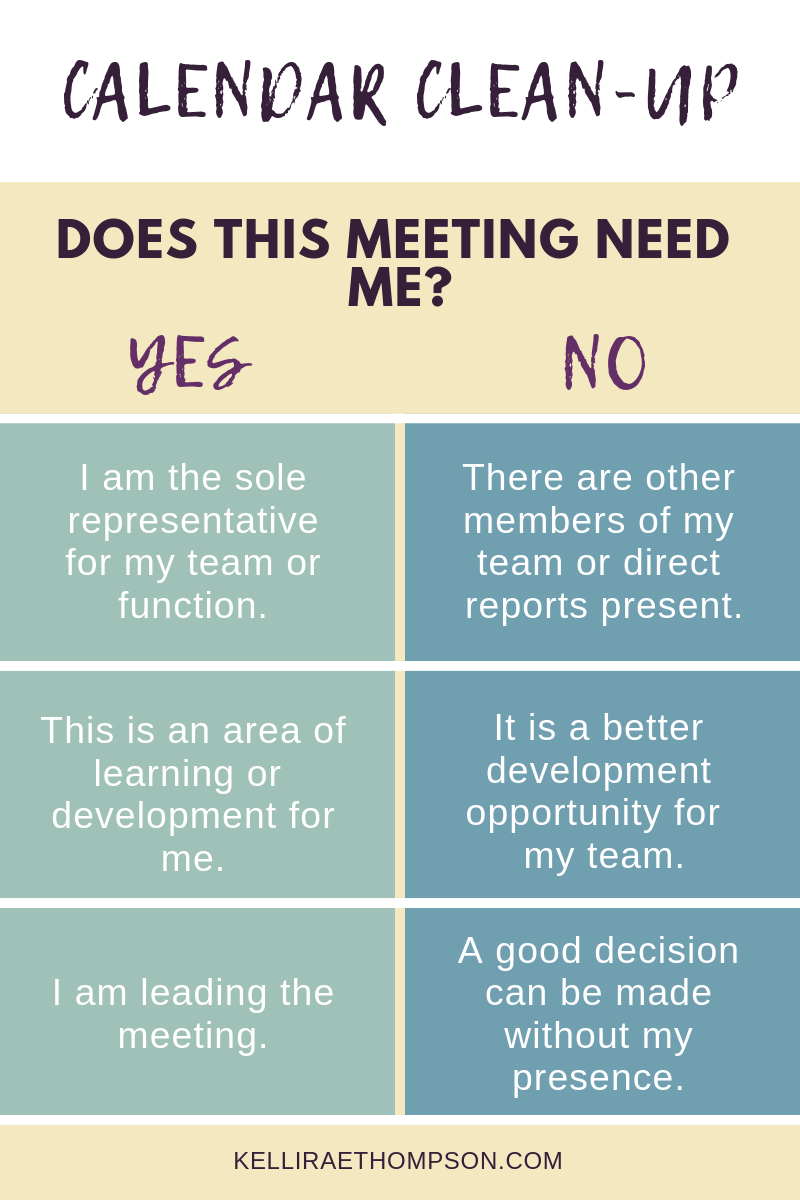The 3 PM slump hit like bricks as I slid joylessly into another meeting. I couldn’t decide if my dazed state was due to the fact I hadn’t eaten lunch yet or because this was my sixth hour-long meeting that day. My brain was scolding, “Sit up straight! Show interest! Ask good questions!” But every other cell was screaming, “We don’t care, please just agree to everything so we can get out of here 20 minutes early and get some food!”

Early in my career, promotions granted me more time spent in meetings, but left me with more guilt-filled evenings sending emails instead of sitting still with family. My overbooked days passed by in gray conference rooms trying to hash out decisions and scheduling meetings to talk about meetings. While it initially felt good to be included, I realized that my crowded calendar also left me overwhelmed and running empty on creative and strategic ideas.
In that hangry, exhausted moment, the obvious smacked me in the face. Two of my employees were with me at that meeting. I did some quick math: (Average hourly salary dollars X 3)= Cost of our bodies in the seats. Is this meeting worth the total cost of us? No. Not even close.
I also noticed that while my team was present, they deferred questions they were capable of answering to me. I had my a-ha! moment, I actually hindered their personal development. Because they had the habit of deferring to me, my presence robbed them of valuable influence, decision-making, and problem-solving skills.
I left my 3 PM slump with a game-changing idea that changed my work/life and lead to instant team development. First, I set aside my need to be involved in every decision, and then I tidied up my crowded days with a calendar audit.
How To Run a Calendar Audit
I looked at my month ahead of meetings and answered some simple questions:
- Do I need, or want, to be there?
- Does my presence add or subtract value for fellow team members also in the meeting?
- Is this a development opportunity for my team to lead?
- How many salary dollars are sitting here? Are we getting a positive return for them?
- What sacred time could this meeting be exchanged for?
Here’s an even quicker cheat sheet to download:

I instantly found several hours worth of meetings in one week I could reclaim — for sanity, planning, email return and even (gasp!) lunch.
After I challenged my team members to step up and contribute to the meetings I delegated to them, I committed to avoiding the next danger zone – I set boundaries to protect my new precious time. For those of you with calendar sharing, you know how quickly your colleagues will quickly fill up free slots. So, I booked myself and refused to feel guilty about it. These “meetings with myself” are just as important to my own productivity as is being present for other people. I chose to believe I was worth my daily sacred time, so I marked the meetings as private. In shared calendar systems, private meetings carry some sort “don’t double-book that” magic.
Today when I coach leaders, I witness this phenomenon pushing the weight of overwhelm and guilt of an unbalanced work/life heavy on their shoulders. I ask them my first question, “What meetings have you sat in this week that didn’t need you?” Many of them have never considered that a promotion could mean that they no longer add value to a meeting. They’ve never thought that their absence could actually help them develop their team. I give them the calendar audit challenge and the next time I talk to them, they are twenty pounds lighter. Not because they’ve lost any scale weight, but because they’ve found valuable freedom in their day to invest in themselves. And they’re more effective leaders, team members, and even find more joy at home because of it.
Whether you’re a leader or a member of any group, I invite you to take the calendar audit. How many hours can you reclaim this week? What will this do for your sanity and joy? What will this allow you to accomplish at work and home?


